WHERE WE CAME FROM . . .
Dad’s Ancestry
In her later years, my mother did an extensive research into the roots
of the Mitchell family of my father. She found that he was descended from
eleven of the Pilgrims who came to America on the three ships of the
Mayflower settlement contract. (I’ll show the name of the ship after
each ancestor when first mentioned). Our name-bearer among
them was Experience Mitchell (in this and the next chapter I'll show direct
descendants of Experience in bold-faced type) who came to the Plymouth
Colony in 1623 on the Anne at the age of 24. His participation in the
division of the colony land into private plots that year and in the
division of the livestock five years later gave him the confidence to
marry Jane Cooke, who at age 14 had come to America on the Anne with him.
They had eight children, four girls and four boys, the youngest of whom,
Edward (I) (born in 1646), is our forebear. After Jane died in
1666, at age 55, Experience married a woman named Mary, of whom nothing
more is known, but they apparently had no children. Experience died at
the ripe old age of 90. (See Appendix N. HISTORY OF PLYMOUTH COLONY.)
Edward (I) married Mary Hayward when he was about
20, but she died childless forty years later. He had grown up in
Duxbury, to which Experience had moved shortly after his marriage in
1628, but later moved to Bridgewater, where he built a house in which
his descendants lived for nearly 200 years. In 1708, Edward
remarried, this time to Alice Bradford (only half his age), the
great-granddaughter of Governor William Bradford (Mayflower) and
Alice Southworth (Anne). They had three children, the youngest of
whom (as first son) was also named Edward, born in 1716 when
his father was 70.
Little is known of Edward (II)
beyond the fact that he participated in the Revolutionary War as a
colonel of the Massachusetts militia. The vital records show that he
married Elizabeth Cushing in 1738, and that they had seven sons and
five daughters. The first son (dutifully named Edward) was
born in 1739.
Like his father, Edward (III) also
participated in the Revolutionary War, as a major of militia,
marrying Jane Latham in 1762. Jane was descended from John Winslow
(Fortune, the second ship of the Mayflower group), and also descended
from James and Suzanna Chilton through their daughter Mary, all three
of whom had come to America on the Mayflower. Mary Chilton is
credited as the first white female to set foot on the mainland of
Massachusetts. Edward (III) and Jane had seven children, the first
boy of whom was, of course, named Edward, born in
1766.
Edward (IV) married Chloe Washburn in 1789, the
year our Nation’s constitution was adopted. Chloe was also
descended from Experience and Jane Mitchell through their daughter
Elizabeth. On her paternal grandmother’s side she was descended
from Degory Priest (Mayflower), through son Phineas (Anne) who
married Mary (Anne), daughter of Mrs. Cuthbert Cuthbertson (Anne).
Edward and Chloe had four daughters, but only one son, Edward,
to carry on the family line, born in 1805.
Edward (V)
married Margaret Seaver in 1830 in Taunton, and established his home
there, terminating the long family residence in the same house in
Bridgewater. Their seven children included three boys, the eldest of
whom became the sixth Edward Mitchell in 1831. This son died at age
10, so the next male child, born a year later (1842) was also named
Edward, in order to carry on the line of Edward Mitchells.
Although Margaret came from families long in America, no new
ancestors from the original Plymouth Colony can be
established.
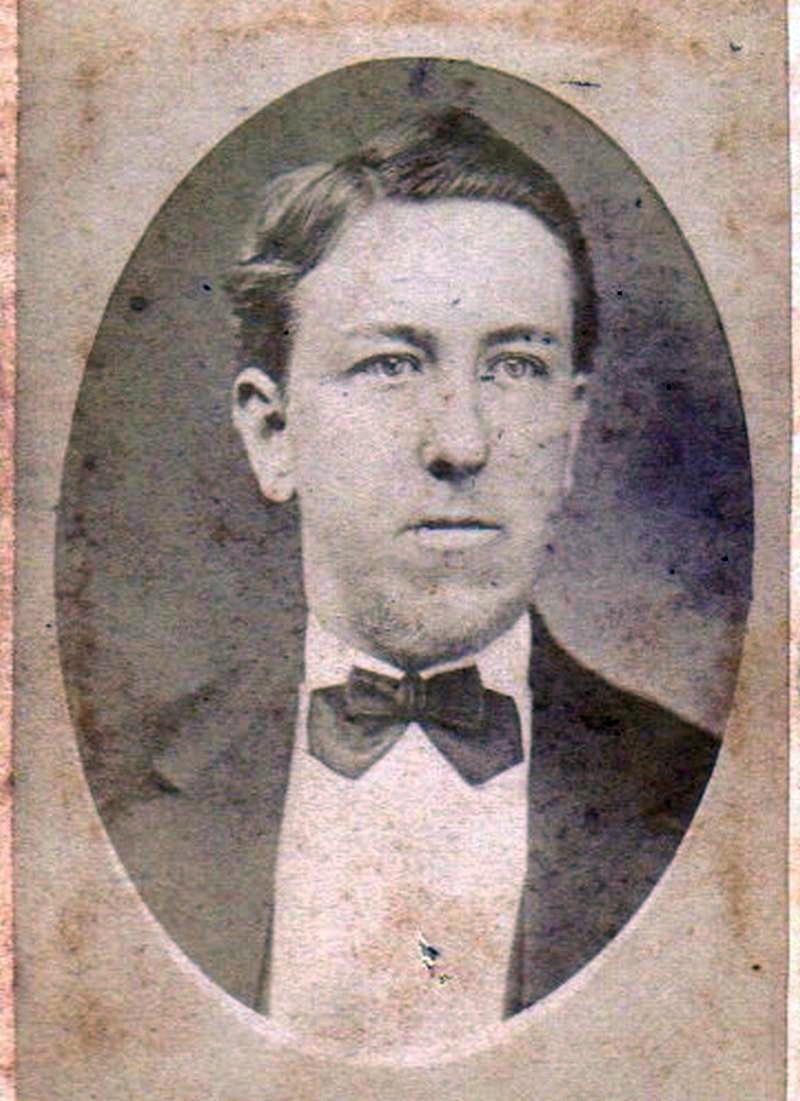
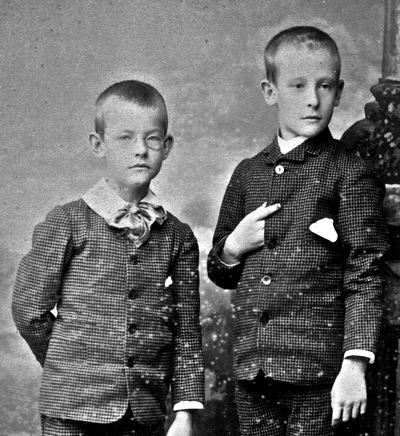
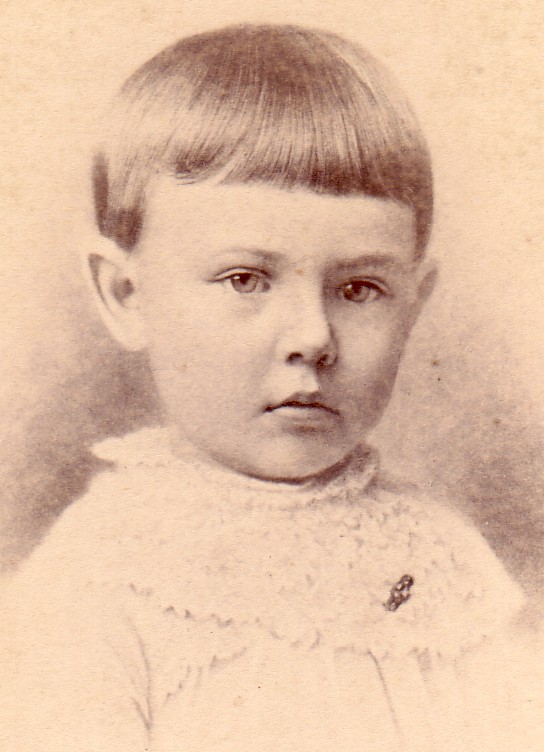 Edward (VI), my paternal grandfather (left), married Cora Cook Staples in
1876. He was a dentist in Taunton, Mass., but was addicted to hard liquor. This was the basis for
Grandmother’s divorce — a rare thing in those days —
and led to a blackout on family relations on his side which still
persists. He died in Boston (before his namesake son) in 1892, from a
fish bone caught in his throat, according to a Boston newspaper. Edward
VII (see third right) (born 1877) was the first of three sons, but died
at age 16, after Grandmother had divorced Grandfather, so the Edward Mitchell
line came to an end.Herbert Francis (Dad) (see second right)
(born September 15, 1878) was the second son. The third son, Willie, (first right)
died early, at age 5 in 1885, so I have no paternal uncles.
Edward (VI), my paternal grandfather (left), married Cora Cook Staples in
1876. He was a dentist in Taunton, Mass., but was addicted to hard liquor. This was the basis for
Grandmother’s divorce — a rare thing in those days —
and led to a blackout on family relations on his side which still
persists. He died in Boston (before his namesake son) in 1892, from a
fish bone caught in his throat, according to a Boston newspaper. Edward
VII (see third right) (born 1877) was the first of three sons, but died
at age 16, after Grandmother had divorced Grandfather, so the Edward Mitchell
line came to an end.Herbert Francis (Dad) (see second right)
(born September 15, 1878) was the second son. The third son, Willie, (first right)
died early, at age 5 in 1885, so I have no paternal uncles.
Grandma Butman
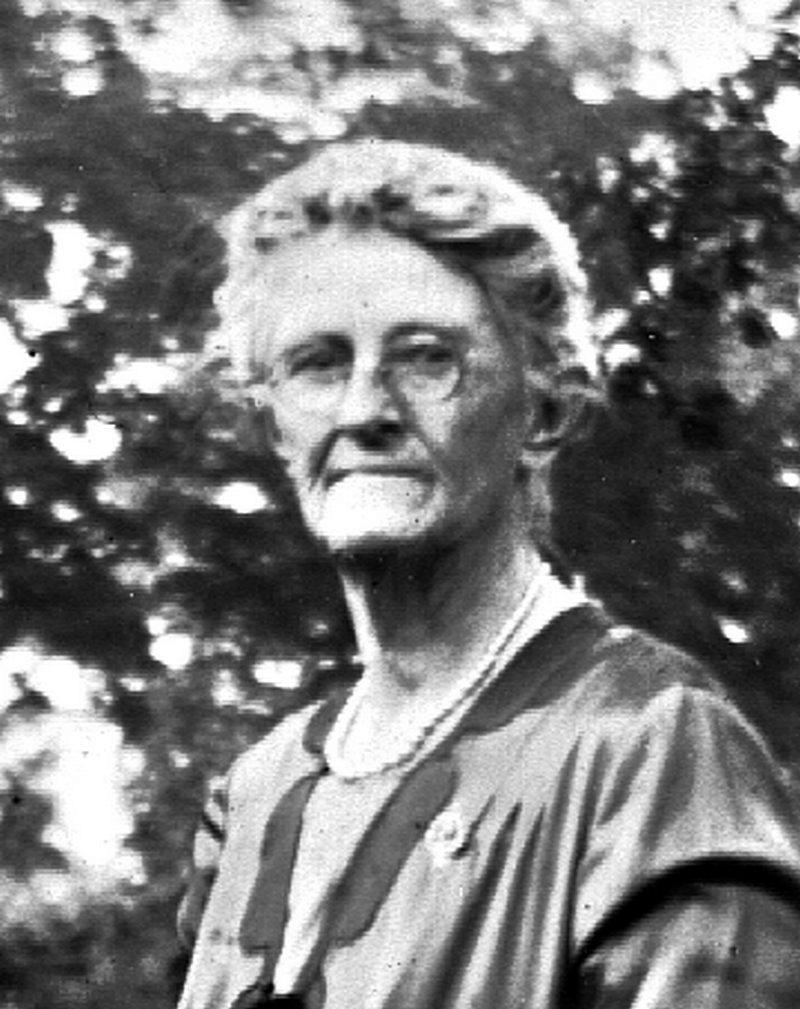 Grandmother’s
ancestry added the names of Peter Browne (Mayflower) and his wife
Mary (Fortune), whose first husband had died during the voyage to
America. Cora Frances Cook had married Edwin Staples when quite
young, though opposed by his family. When he died a little over a
year later, the family refused to allow her a share in his ample
estate, contending that as a minor she was not entitled to it.
Grandmother never got over that injustice. After her divorce of
Edward Mitchell, Grandmother supported herself and family for a
number of years, until she married Henry Butman long after Dad’s
marriage, and settled in Youngstown, Ohio. She won a national
competition for selling Mark Twain’s "Life on the
Mississippi” and received as part of the prize an autographed
copy. Unfortunately this was burned in a fire in my sister Margaret’s
house many years later.
Grandmother’s
ancestry added the names of Peter Browne (Mayflower) and his wife
Mary (Fortune), whose first husband had died during the voyage to
America. Cora Frances Cook had married Edwin Staples when quite
young, though opposed by his family. When he died a little over a
year later, the family refused to allow her a share in his ample
estate, contending that as a minor she was not entitled to it.
Grandmother never got over that injustice. After her divorce of
Edward Mitchell, Grandmother supported herself and family for a
number of years, until she married Henry Butman long after Dad’s
marriage, and settled in Youngstown, Ohio. She won a national
competition for selling Mark Twain’s "Life on the
Mississippi” and received as part of the prize an autographed
copy. Unfortunately this was burned in a fire in my sister Margaret’s
house many years later.
As a boy, I got to know my paternal
grandmother very well, as she lived in our house in her later years.
Grandma Butman was a somewhat stern person who liked to rule the
roost. Dad gave her that chance for nearly a year when our whole
family were her “boarders". This was very difficult for
Mother, so the arrangement was finally ended. We loved to refer to
her as Cora Frances Cook Staples Mitchell Butman. Grandma had a cat
named Tag, who was considerably older than I was. This cat ruled the
house, whether Mother liked it or not. In days when a dollar was a
lot of money, he was fed salmon one day and liver the next. I was
sure he ate better than we did.
No doubt as a result of her
years with an alcoholic husband, Grandma became a rabid
prohibitionist, a WCTUer. Dad and Mother were also abstainers, so
alcoholic beverages of any kind were almost unknown in our house.
Once in a while Dad would bring home a can of his favorite candy,
rum-flavored toffee. On one of these occasions, Dad teased his mother
(as he frequently did) when she accepted a piece of the candy. “You
know it has rum in it, Mother.” "Go along with you,
Herbert." “Look at the label.” When she read that
the candy was indeed flavored with rum, she would have nothing more
to do with it, although she had enjoyed eating it for a long time.
Mother’s Forebears
Mother didn’t unearth nearly as much information about her own
family. I remember her saying that her great-grandfather Elisha
Phelps was born in England, and I have just learned from a
conversation my sister Margaret had with her older sister Marion
before her death that this Elisha Phelps was one of five Methodist
ministers sent to the American colonies in the 1700’s. All five
married Catholic women, Elisha’s wife being Rachel Payne of a
colonial family of Paynes from Pennsylvania. Elisha Payne Phelps was
born in 1815, and also became a Methodist minister. He was a circuit
rider for Virginia, Maryland, and Delaware, living in Staunton
(Virginia), Cumberland (Maryland), and later on Mt. Vernon Place in
Washington. We know that he lived in Cumberland when my grandfather,
Thomas William Smith Phelps, was born on Sept. 20, 1850, and that he
was the pastor of the Foundry Methodist Church, then in Georgetown,
from 1852 to 1854. When the Civil War broke out, the Methodist Church
split North and South. The Southern branch offered Rev. Phelps a
bishopric, but he supported the Union, and became the District
Superintendent for Maryland (and possibly other areas). In moving
from Baltimore back to Cumberland in 1863, the freight train carrying
all his household goods was burned by a Confederate raiding party.
When his church failed to help him replace his furniture and effects,
he left the church, studied law, and spent the rest of his life
defending imprisoned Confederate soldiers. He had married Mary
Winifrede Bennett (for whom my mother was named), daughter of Sidnor
Bennett, high sheriff of Loudoun County, Virginia, and called the
belle of Loudoun County.
Grandpa Phelps
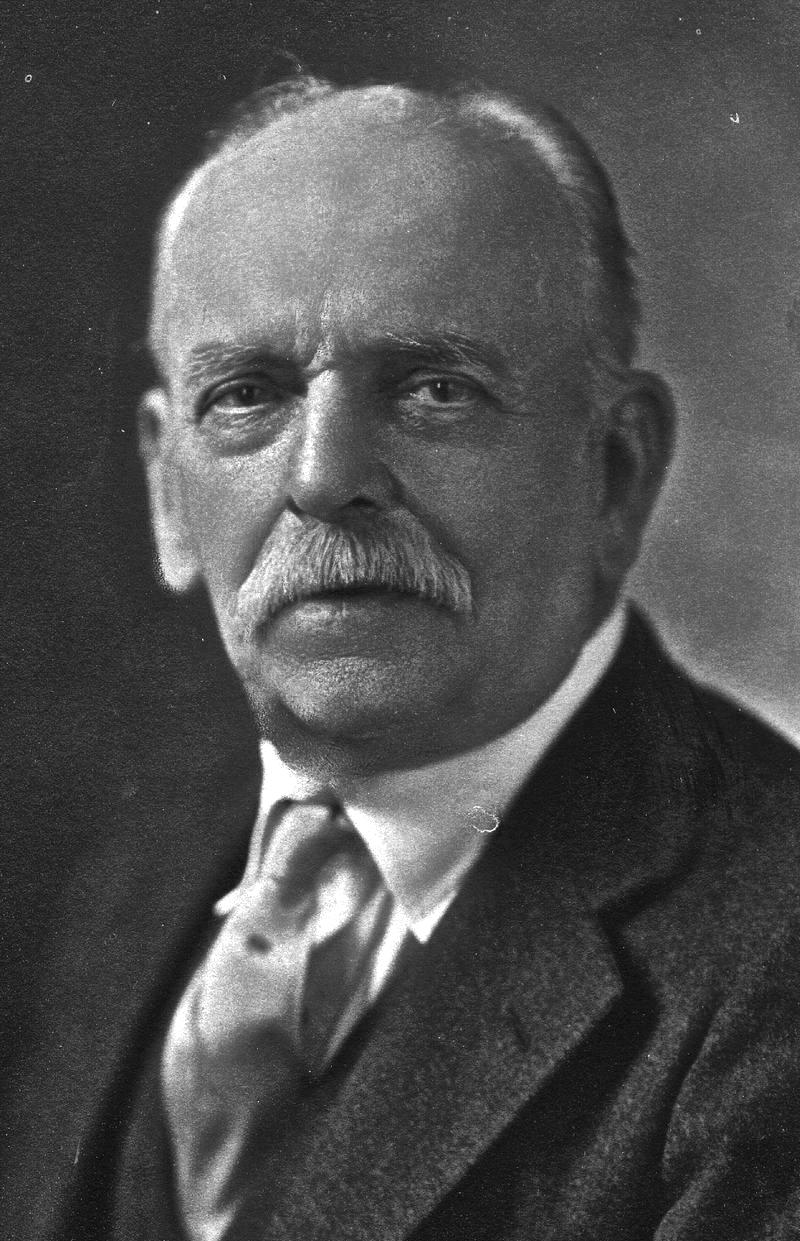
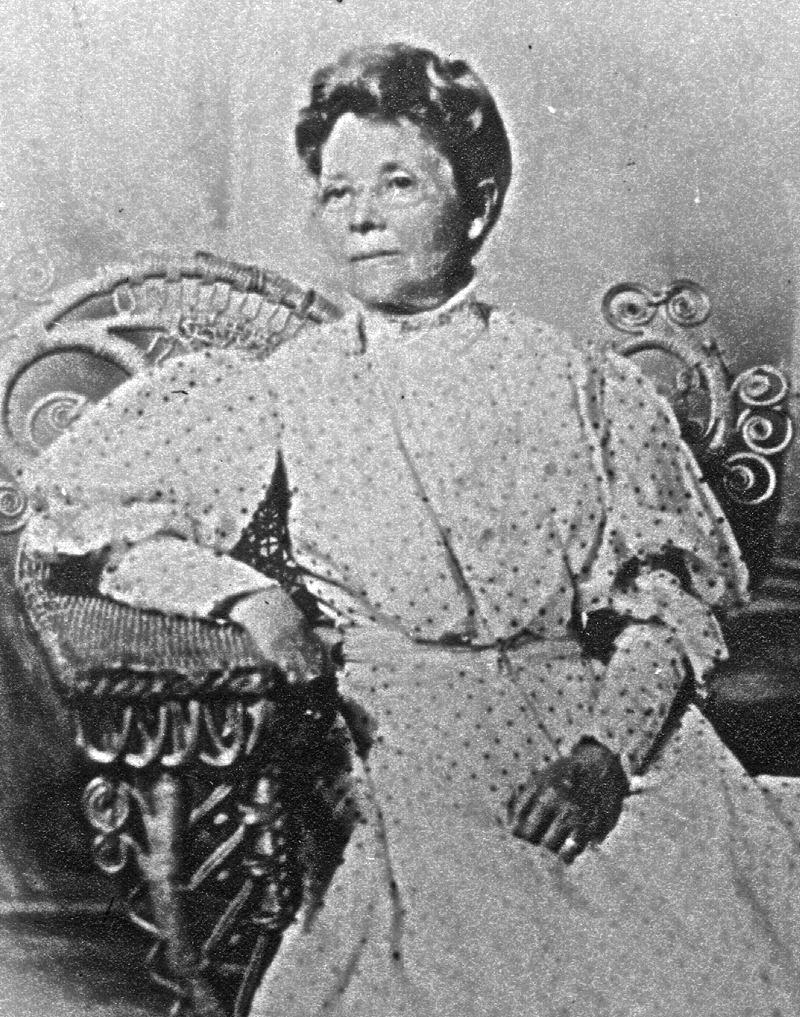 Grandpa
Phelps grew up as a preacher’s son, which probably explains why
he wouldn’t set foot in a church in his later years. He tells
of one Thanksgiving Day when his father sent him to three deacons’
homes with a message. He arrived at each during the Thanksgiving
feast and was invited to participate. On arriving home he had his
fourth dinner! Grandpa married Mary Josephine Colgen (for whom my
younger sister was named) in April of 1875. She had been born in 1850
in York, England, where her father was the architect of the York
Abbey. He died before she was born, and her mother came to Boston. On
the ship the mother met a man whom she later married. Among their
friends was the Nazro family from whom Marion got her middle name.
They had three children. Bernard, the first-born, died in infancy.
Wilbur Moorhead (my only uncle) was born in 1877, and Mary Winifrede
(Mother) was born July 9, 1880, in Laurel, where she grew up. Shortly
after Cleveland became President in 1884, Grandpa was appointed head
of the Photography Branch of the Treasury Department. He took the
first pictures of the city of Washington from the top of the
unfinished Washington monument. When Cleveland was defeated for
reelection in 1897 (when the family still lived in Laurel), Grandpa
lost his job, as Civil Service had not yet come into being and "to
the victor belonged the spoils." He didn’t want to tell
his ailing wife, so he left each morning as though going to work and
returned at night at the appropriate time. He finally found work as
the conductor of a horse car on muddy Pennsylvania Avenue, and the
family then moved to Washington.
Grandpa
Phelps grew up as a preacher’s son, which probably explains why
he wouldn’t set foot in a church in his later years. He tells
of one Thanksgiving Day when his father sent him to three deacons’
homes with a message. He arrived at each during the Thanksgiving
feast and was invited to participate. On arriving home he had his
fourth dinner! Grandpa married Mary Josephine Colgen (for whom my
younger sister was named) in April of 1875. She had been born in 1850
in York, England, where her father was the architect of the York
Abbey. He died before she was born, and her mother came to Boston. On
the ship the mother met a man whom she later married. Among their
friends was the Nazro family from whom Marion got her middle name.
They had three children. Bernard, the first-born, died in infancy.
Wilbur Moorhead (my only uncle) was born in 1877, and Mary Winifrede
(Mother) was born July 9, 1880, in Laurel, where she grew up. Shortly
after Cleveland became President in 1884, Grandpa was appointed head
of the Photography Branch of the Treasury Department. He took the
first pictures of the city of Washington from the top of the
unfinished Washington monument. When Cleveland was defeated for
reelection in 1897 (when the family still lived in Laurel), Grandpa
lost his job, as Civil Service had not yet come into being and "to
the victor belonged the spoils." He didn’t want to tell
his ailing wife, so he left each morning as though going to work and
returned at night at the appropriate time. He finally found work as
the conductor of a horse car on muddy Pennsylvania Avenue, and the
family then moved to Washington.
Grandpa Phelps was a
completely different sort of person from Grandma Butman. He was kind
and accommodating to a fault. Although 70 was the required retirement
age at that time, Grandpa was such a valuable employee to the
Washington (DC) Water Department that they allowed him to work until
age 78, in order to qualify for maximum retirement, $100 a month,
based on his service as head of the Photographic Branch of the
Treasury Department in Cleveland’s administration. I hardly
knew my grandmother Phelps. I can only remember her as a very old
lady, always in bed, when I made a rare visit to my grandparents when
they lived in Washington. As she was unable to get his meals, he
would eat at a nearby restaurant, where he took me at meal time. I
can remember my surprise at his eating habits — he ate his pie
first and his soup last!
Grandpa came to live with us in the
late twenties, when I was about 14 and he 78. As he worked at night,
he had to sleep during the day. His room was on the first floor, near
the stairway to the second, where my room was. He was continually
taking me to task for the "horses" on the stairs as I went
up and down during his sleeping time. When I got to dating age, he
loaned me his car. I was very careful to replace the gas I used, as
he kept very detailed records of everything. But every now and then
he would tell me I had put in too much gas and give me some money,
although I knew very well that I hadn’t.
Mother and Dad
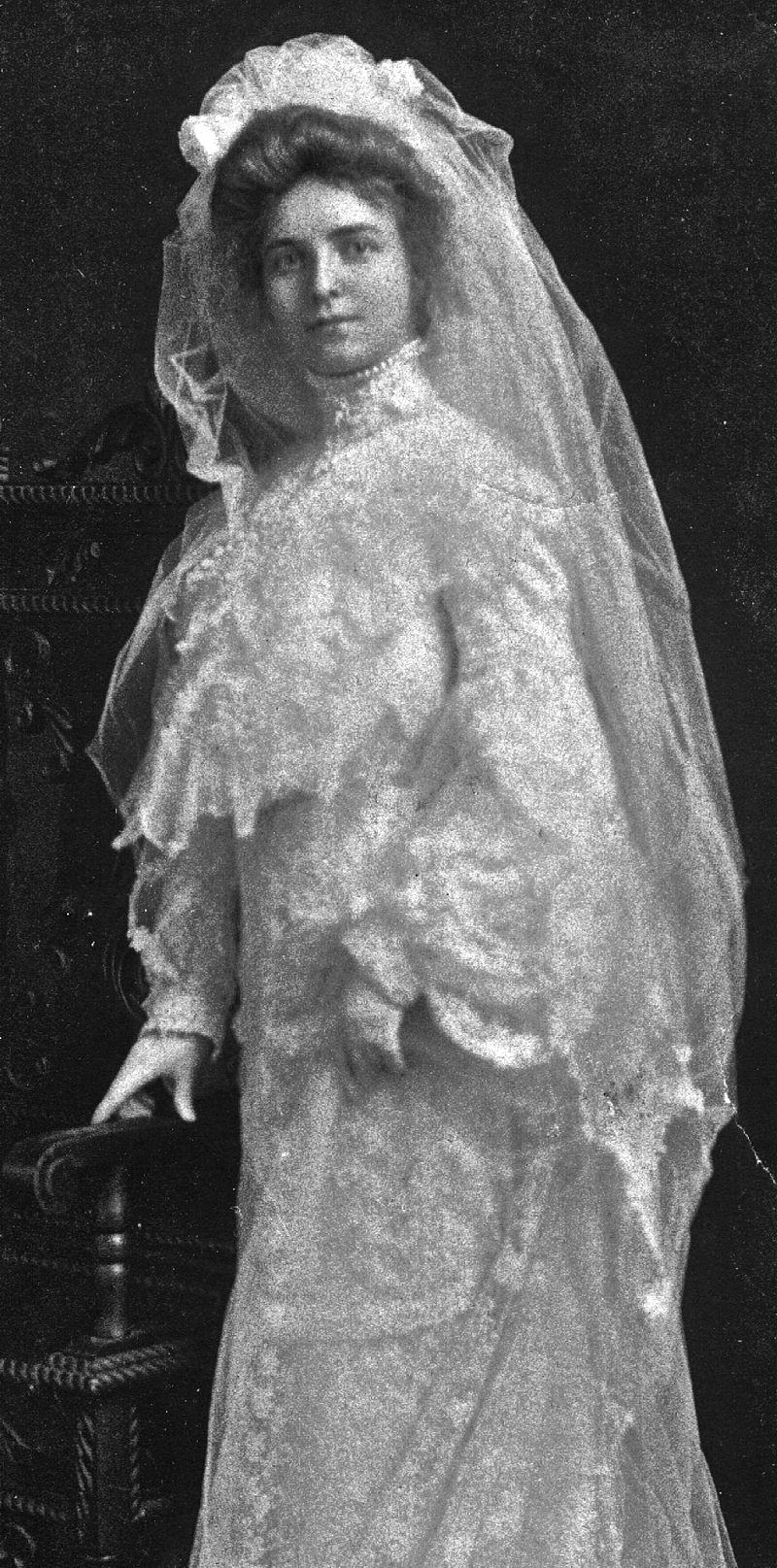
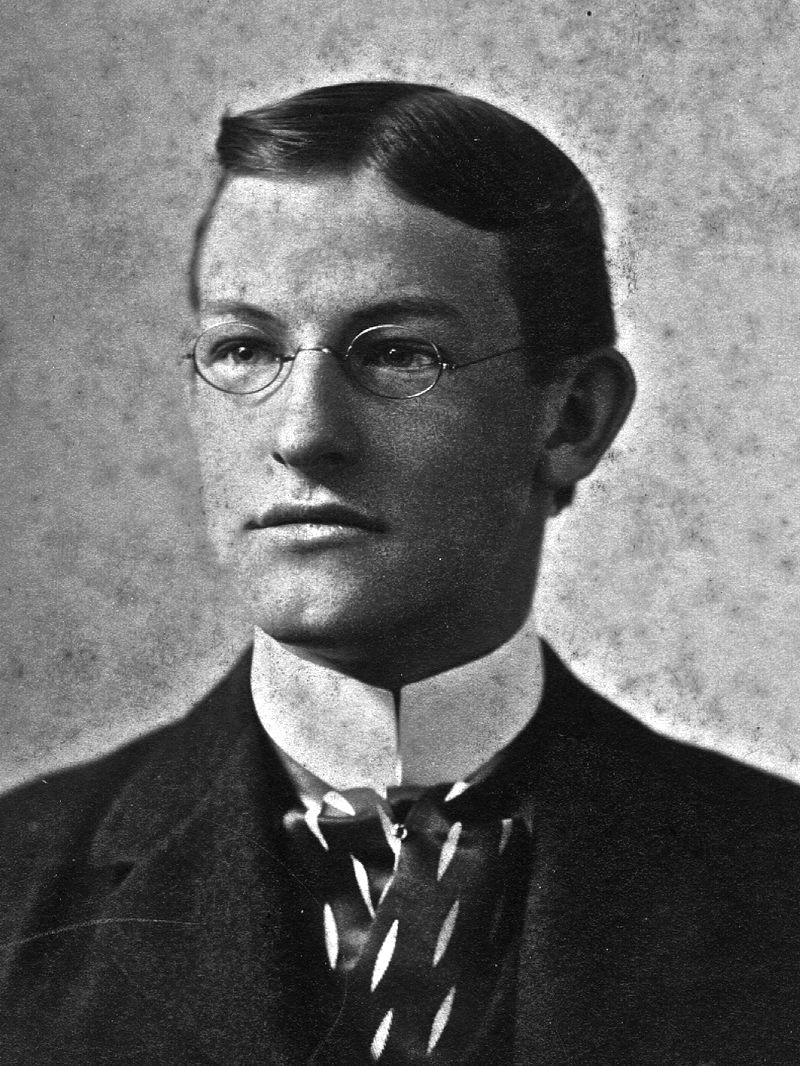 Mother
had completed two years at Columbian College (now George Washington
University), but had to drop out because of ill health. She was a
beautiful young woman, as her pictures show, and Dad often referred
to her as "the belle of Washington." When I attended GWU
forty years later, I had the same professor (Wilbur) of English that
she had had! When Mother recovered from her illness, she took a job
at the nearby Library of Congress. This experience early in her life
made her able to do research there in her later life, and explains
her ability to identify our family roots in the Mayflower settlement
at Plymouth Rock.
Mother
had completed two years at Columbian College (now George Washington
University), but had to drop out because of ill health. She was a
beautiful young woman, as her pictures show, and Dad often referred
to her as "the belle of Washington." When I attended GWU
forty years later, I had the same professor (Wilbur) of English that
she had had! When Mother recovered from her illness, she took a job
at the nearby Library of Congress. This experience early in her life
made her able to do research there in her later life, and explains
her ability to identify our family roots in the Mayflower settlement
at Plymouth Rock.
Dad had been a good student at high school,
and so was able to gain admission to Princeton University (then as
now one of the Ivy League Colleges). One of his professors was
Woodrow Wilson, later to become President. Dad was very proud of a
$50 prize from Professor Wilson for his history paper, and of a
personal post-card he received from him as President. After his
retirement at 70 he attended nearly all of the annual reunions of his
class of ‘99, lamenting at the loss by death of so many of
those he remembered from his college days. His proficiency in Latin
and Greek helped him to earn extra money by tutoring some of the less
capable students. After graduating from Princeton, he attended the
Georgetown University Law School, and was admitted to the bar. He was
very proud that he was entitled to represent clients before the
Supreme Court of the United States. He never did enter law as a
profession, however, as he said an honest person couldn’t make
a living at law. Somewhere along the line he picked up an
accreditation in accounting, and worked as an accountant at a steel
mill in Youngstown, Ohio, during the summers of the early
1920’s.
Mother and Dad had a courtship of over two
years, as Grandpa Phelps insisted that he get a job before marrying
Mother. So Dad gave up the idea of practicing law and got a job in
the Washington Navy Yard, and they were married very soon thereafter,
on December 22, 1903, having their honeymoon at Niagara Falls. On
their vacation trip in the summer of 1905, Dad took Mother to the
Canadian Rockies on the Canadian Pacific Railroad. Mother later told
of one incident when the train had stopped at a small station high in
the Canadian Rockies. Dad got out "to stretch his legs,"
and walked along the platform behind the train. To his horror, the
train started moving away from him after a single toot from its
whistle. Dad sprinted after it while Mother stood at the rear
observation platform, and was just barely able to grab him and help
him aboard, puffing and blowing due to the high altitude. Mother said
that she didn’t know what she would have done if he had missed
the train, as he had all their money and tickets!
Grandma
Butman died in December 1937 and Grandpa Phelps died eight months
later, both at the age of 87. My wife’s father George Chapman
also died in 1937, as did several others among our in-law relatives
within that 12-month period. Uncle Wilbur died in 1948, in the same
bed his father had died in ten years earlier.
Go
to next chapter
Return to Table of
Contents


 Edward (VI), my paternal grandfather (left), married Cora Cook Staples in
1876. He was a dentist in Taunton, Mass., but was addicted to hard liquor. This was the basis for
Grandmother’s divorce — a rare thing in those days —
and led to a blackout on family relations on his side which still
persists. He died in Boston (before his namesake son) in 1892, from a
fish bone caught in his throat, according to a Boston newspaper. Edward
VII (see third right) (born 1877) was the first of three sons, but died
at age 16, after Grandmother had divorced Grandfather, so the Edward Mitchell
line came to an end.Herbert Francis (Dad) (see second right)
(born September 15, 1878) was the second son. The third son, Willie, (first right)
died early, at age 5 in 1885, so I have no paternal uncles.
Edward (VI), my paternal grandfather (left), married Cora Cook Staples in
1876. He was a dentist in Taunton, Mass., but was addicted to hard liquor. This was the basis for
Grandmother’s divorce — a rare thing in those days —
and led to a blackout on family relations on his side which still
persists. He died in Boston (before his namesake son) in 1892, from a
fish bone caught in his throat, according to a Boston newspaper. Edward
VII (see third right) (born 1877) was the first of three sons, but died
at age 16, after Grandmother had divorced Grandfather, so the Edward Mitchell
line came to an end.Herbert Francis (Dad) (see second right)
(born September 15, 1878) was the second son. The third son, Willie, (first right)
died early, at age 5 in 1885, so I have no paternal uncles. Grandmother’s
ancestry added the names of Peter Browne (Mayflower) and his wife
Mary (Fortune), whose first husband had died during the voyage to
America. Cora Frances Cook had married Edwin Staples when quite
young, though opposed by his family. When he died a little over a
year later, the family refused to allow her a share in his ample
estate, contending that as a minor she was not entitled to it.
Grandmother never got over that injustice. After her divorce of
Edward Mitchell, Grandmother supported herself and family for a
number of years, until she married Henry Butman long after Dad’s
marriage, and settled in Youngstown, Ohio. She won a national
competition for selling Mark Twain’s "Life on the
Mississippi” and received as part of the prize an autographed
copy. Unfortunately this was burned in a fire in my sister Margaret’s
house many years later.
Grandmother’s
ancestry added the names of Peter Browne (Mayflower) and his wife
Mary (Fortune), whose first husband had died during the voyage to
America. Cora Frances Cook had married Edwin Staples when quite
young, though opposed by his family. When he died a little over a
year later, the family refused to allow her a share in his ample
estate, contending that as a minor she was not entitled to it.
Grandmother never got over that injustice. After her divorce of
Edward Mitchell, Grandmother supported herself and family for a
number of years, until she married Henry Butman long after Dad’s
marriage, and settled in Youngstown, Ohio. She won a national
competition for selling Mark Twain’s "Life on the
Mississippi” and received as part of the prize an autographed
copy. Unfortunately this was burned in a fire in my sister Margaret’s
house many years later.
 Grandpa
Phelps grew up as a preacher’s son, which probably explains why
he wouldn’t set foot in a church in his later years. He tells
of one Thanksgiving Day when his father sent him to three deacons’
homes with a message. He arrived at each during the Thanksgiving
feast and was invited to participate. On arriving home he had his
fourth dinner! Grandpa married Mary Josephine Colgen (for whom my
younger sister was named) in April of 1875. She had been born in 1850
in York, England, where her father was the architect of the York
Abbey. He died before she was born, and her mother came to Boston. On
the ship the mother met a man whom she later married. Among their
friends was the Nazro family from whom Marion got her middle name.
They had three children. Bernard, the first-born, died in infancy.
Wilbur Moorhead (my only uncle) was born in 1877, and Mary Winifrede
(Mother) was born July 9, 1880, in Laurel, where she grew up. Shortly
after Cleveland became President in 1884, Grandpa was appointed head
of the Photography Branch of the Treasury Department. He took the
first pictures of the city of Washington from the top of the
unfinished Washington monument. When Cleveland was defeated for
reelection in 1897 (when the family still lived in Laurel), Grandpa
lost his job, as Civil Service had not yet come into being and "to
the victor belonged the spoils." He didn’t want to tell
his ailing wife, so he left each morning as though going to work and
returned at night at the appropriate time. He finally found work as
the conductor of a horse car on muddy Pennsylvania Avenue, and the
family then moved to Washington.
Grandpa
Phelps grew up as a preacher’s son, which probably explains why
he wouldn’t set foot in a church in his later years. He tells
of one Thanksgiving Day when his father sent him to three deacons’
homes with a message. He arrived at each during the Thanksgiving
feast and was invited to participate. On arriving home he had his
fourth dinner! Grandpa married Mary Josephine Colgen (for whom my
younger sister was named) in April of 1875. She had been born in 1850
in York, England, where her father was the architect of the York
Abbey. He died before she was born, and her mother came to Boston. On
the ship the mother met a man whom she later married. Among their
friends was the Nazro family from whom Marion got her middle name.
They had three children. Bernard, the first-born, died in infancy.
Wilbur Moorhead (my only uncle) was born in 1877, and Mary Winifrede
(Mother) was born July 9, 1880, in Laurel, where she grew up. Shortly
after Cleveland became President in 1884, Grandpa was appointed head
of the Photography Branch of the Treasury Department. He took the
first pictures of the city of Washington from the top of the
unfinished Washington monument. When Cleveland was defeated for
reelection in 1897 (when the family still lived in Laurel), Grandpa
lost his job, as Civil Service had not yet come into being and "to
the victor belonged the spoils." He didn’t want to tell
his ailing wife, so he left each morning as though going to work and
returned at night at the appropriate time. He finally found work as
the conductor of a horse car on muddy Pennsylvania Avenue, and the
family then moved to Washington.
 Mother
had completed two years at Columbian College (now George Washington
University), but had to drop out because of ill health. She was a
beautiful young woman, as her pictures show, and Dad
Mother
had completed two years at Columbian College (now George Washington
University), but had to drop out because of ill health. She was a
beautiful young woman, as her pictures show, and Dad